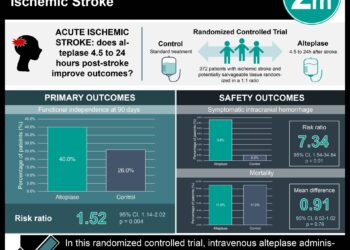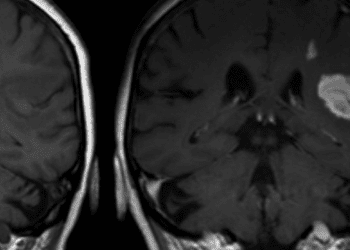Risk of dementia may be increased following incident ischemic stroke: the ARIC study
1. The risk of developing dementia was increased for those who had suffered an ischemic stroke in a dose-dependent manner based on intensity and number of stroke events.
Level of Evidence Rating: 2 (Good)
Study Rundown: Strokes and their sequelae can have severe and debilitating impacts on an individual’s cognition and ability to function independently, particularly in older adults. The risk of developing dementia following stroke is poorly understood, although this information is prognostically important. This prospective cohort study conducted by the Atherosclerosis Risk in Communities Neurocognitive (ARIC) Study sought to understand the relationship between dementia risk and stroke history. This study includes data from 15,792 adults enrolled between 1987 and 1989, encompassing several decades of data. 1378 incident stroke events (including probable and definite events) occurred over the study period, the majority (62.8%) of which were mild. 2902 cases of dementia were diagnosed over the study period; of these, 42 patients were excluded because their dementia diagnosis was within one year of stroke and 269 of the remaining 2860 had had a preceding stroke. The median time between stroke and onset of dementia was 7.2 years. The risk of dementia following stroke was significantly higher than in patients who had not had a stroke before. As well, the risk seemed to correlate with stroke severity and number of stroke events in a dose-dependent manner. Koton et al concluded that stroke is a risk factor for dementia development, and that stroke severity and frequency positively correlate with the risk of dementia. Advantages of this work include the large sample size and considerable follow up period, as well as the prospective nature of this study. However, reliance on a patchwork of data collection methods over time may have contributed to poor quality data (i.e., changing definition of stroke severity throughout the study period). Additionally, residual confounding may be present from a lack of comprehensive comorbidity data.
Click here to read this study in JAMA Neurology
Relevant reading: Stroke and dementia risk: a systematic review and meta-analysis
In-Depth [prospective cohort study]: Data was collected from participants in four large American cities over the course of 7 possible study visits. Median follow up was 25.5 years (IQR 18.0-29.9). Stroke incidence was ascertained through a review of hospitalization records between 1987 and 2019. Several means were used to assess cognitive function over the study period, including through in-person testing, a computer algorithm and phone visits. Stroke severity was graded through the National Institutes of Health Stroke Scale by study physicians as minor, mild, moderate or severe. Baseline hypertension (p = 0.006) and mean blood pressure (p = 0.005) were found to be significantly different between patients who did versus did not have a stroke. Most stroke events were considered to be mild (62.8%), 22.1% were minor, 7.9% were moderate and 7.1% were severe. At the end of the study period in 2019, 55.6% of enrolled participants had died and 6.5% had dropped out of study participation. The adjusted incidence ratio for dementia in patients without stroke was 0.47 (95% confidence interval 0.44-0.50) and was 1.21 (1.05-1.40) in patients with a history of stroke. The hazard ratio for dementia compared to patients who had not had a stroke was 1.76 (95% confidence interval, 1.49-2.00) for 1 minor to mild stroke, 3.47 (2.23-5.40) for 1 moderate to severe stroke, 3.48 (2.54-4.76) for 2 or more minor to mild strokes, and 6.68 (3.77-11.83) for 2 or more moderate to severe strokes. The proportion of dementia risk attributable to stroke was 17.4% (4.8-28.6%). These findings were robust to sensitivity analysis including using variable dates for dementia diagnosis, used interval censoring or looked at the competing risks of death.
Image: PD
©2022 2 Minute Medicine, Inc. All rights reserved. No works may be reproduced without expressed written consent from 2 Minute Medicine, Inc. Inquire about licensing here. No article should be construed as medical advice and is not intended as such by the authors or by 2 Minute Medicine, Inc.









